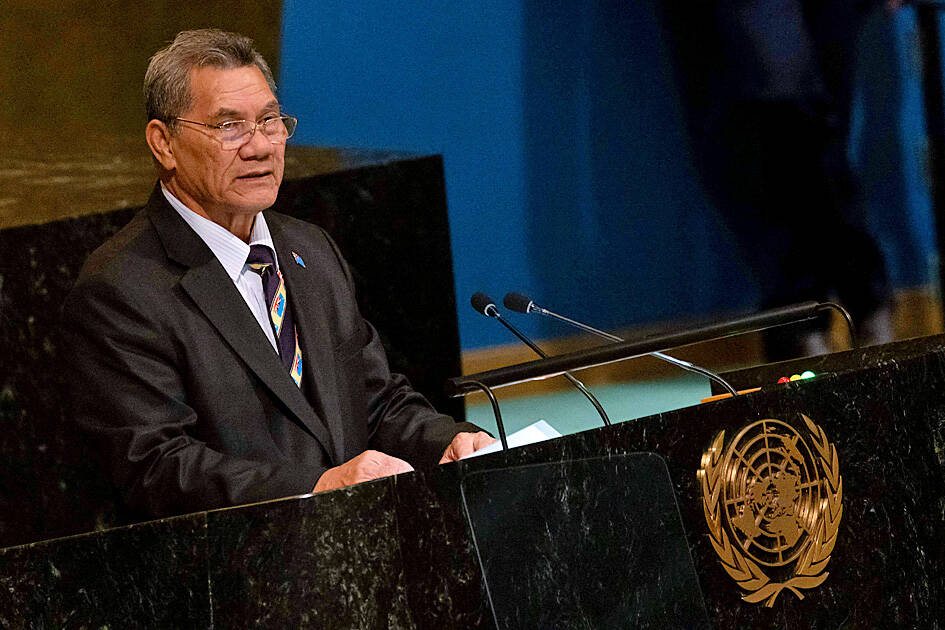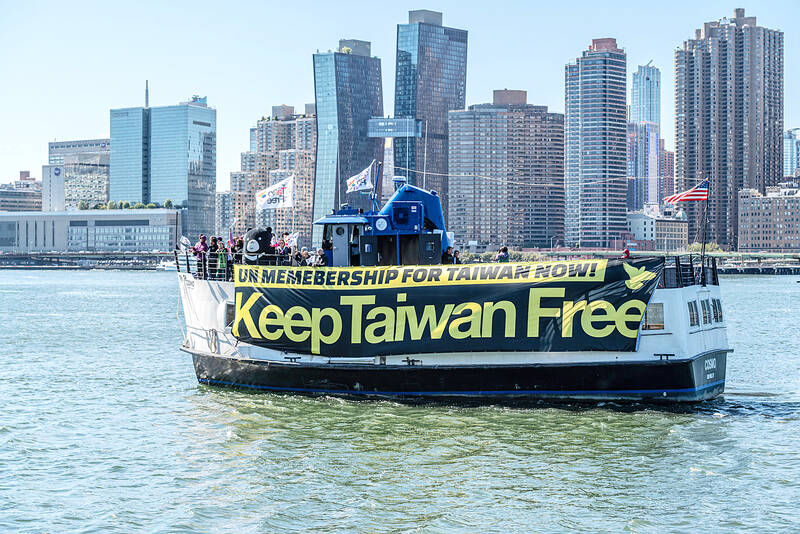The leaders of the EU and of Taiwan’s four diplomatic allies on Friday expressed concern over the stability of the Taiwan Strait and voiced support for Taiwan’s inclusion in the UN during a meeting of the UN General Assembly.
The 77th UN General Assembly which began on Tuesday and ends tomorrow, is its first in-person session since the COVID-19 pandemic began in 2020.
European Council President Charles Michel said the EU calls for maritime security and the preservation of stability in the Taiwan Strait.

Photo: AFP
Michel said the bloc recognizes Beijing’s “one China” principle, but “will not close our eyes to the violations of human rights” in Xinjiang and Hong Kong.
“We want emerging powers, including China, to participate sincerely in the collective efforts for peace and development,” he said.
Michel’s remarks came just two days after US President Joe Biden said that Washington seeks to “uphold peace and stability across the Taiwan Strait.”

Photo: CNA
Taiwan’s Caribbean ally Saint Lucia also expressed concern over tensions in the Taiwan Strait at the General Assembly.
St Lucian Prime Minister Philip Pierre said the recent escalation of military tensions in the Taiwan Strait had “threatened regional and international peace and security.”
“Saint Lucia calls upon those responsible to observe the UN rules on peaceful settlement of disputes and respect for the territorial integrity and political independence of all countries,” he said.
Pierre also championed “the meaningful participation of Taiwan in the organs and agencies of the United Nations,” adding that Taiwanese “ought to be allowed to continue their chosen path to economic, social and cultural development and to confirm their right to self-determination.”
St Kitts and Nevis Prime Minister Terrance Drew stated his country’s “unswerving support for Taiwan’s meaningful participation in the UN system.”
“Taiwan has been a long-standing friend and a partner for sustainable development,” he said.
He added that the UN would be “stronger” in the company of “those who share our democratic principles and values.”
Tuvaluan Prime Minister Kausea Natano said it is “regrettable” that Taiwan continues to be kept out of the UN system despite “its notable partnerships on a wide range of development issues.”
“Tuvalu strongly supports the readmission of the Republic of China, Taiwan, into the UN as a founding member of the United Nations, and its active participation in UN specialized agencies, including the World Health Organization, the International Civil Aviation Organization and the United Nations Framework Convention on Climate Change,” Natano said.
Belizean Prime Minister John Briceno said the Central American nation “calls for Taiwan to take its rightful place among the international community of nations.”
Taiwan is excluded from the international community, although efforts toward global prosperity require the participation of all countries and peoples, Briceno said.
“The outdated policy imposed on Taiwan to promote its exclusion must yield to the greater good,” he added.
Solomon Islands Prime Minister Manasseh Sogavare called on “all countries to be sensitive and not inflame tensions that can threaten the unity and security of any country.”
The Solomon Islands and Taiwan severed diplomatic ties in 2019, when the Pacific island state established diplomatic relations with China.
Sogavare defended his government’s decision to switch allegiance, saying it was made “through democratic processes by a democratically elected government.”
The Ministry of Foreign Affairs in Taipei yesterday thanked the US, the EU and other like-minded nations for their discussion of Taiwan at the General Assembly.
China frequently claims that cooperation with Taiwan contravenes its so-called “one China” principle, and uses countries’ signs of support for Taiwan as justification for military aggression, it said.
However, the attention brought to the issue by the international community during the assembly has made it difficult for China to hide its undermining of peace and stability in the Taiwan Strait, it said.
“We call on all countries to continue to condemn Chinese aggression, and meanwhile we will continue to strengthen our self-defense capabilities, our security partnership with the US and to cooperate with all like-minded countries,” it said.

ENDEAVOR MANTA: The ship is programmed to automatically return to its designated home port and would self-destruct if seized by another party The Endeavor Manta, Taiwan’s first military-specification uncrewed surface vehicle (USV) tailor-made to operate in the Taiwan Strait in a bid to bolster the nation’s asymmetric combat capabilities made its first appearance at Kaohsiung’s Singda Harbor yesterday. Taking inspiration from Ukraine’s navy, which is using USVs to force Russia’s Black Sea fleet to take shelter within its own ports, CSBC Taiwan (台灣國際造船) established a research and development unit on USVs last year, CSBC chairman Huang Cheng-hung (黃正弘) said. With the exception of the satellite guidance system and the outboard motors — which were purchased from foreign companies that were not affiliated with Chinese-funded

PERMIT REVOKED: The influencer at a news conference said the National Immigration Agency was infringing on human rights and persecuting Chinese spouses Chinese influencer “Yaya in Taiwan” (亞亞在台灣) yesterday evening voluntarily left Taiwan, despite saying yesterday morning that she had “no intention” of leaving after her residence permit was revoked over her comments on Taiwan being “unified” with China by military force. The Ministry of the Interior yesterday had said that it could forcibly deport the influencer at midnight, but was considering taking a more flexible approach and beginning procedures this morning. The influencer, whose given name is Liu Zhenya (劉振亞), departed on a 8:45pm flight from Taipei International Airport (Songshan airport) to Fuzhou, China. Liu held a news conference at the airport at 7pm,

AIR SUPPORT: The Ministry of National Defense thanked the US for the delivery, adding that it was an indicator of the White House’s commitment to the Taiwan Relations Act Deputy Minister of National Defense Po Horng-huei (柏鴻輝) and Representative to the US Alexander Yui on Friday attended a delivery ceremony for the first of Taiwan’s long-awaited 66 F-16C/D Block 70 jets at a Lockheed Martin Corp factory in Greenville, South Carolina. “We are so proud to be the global home of the F-16 and to support Taiwan’s air defense capabilities,” US Representative William Timmons wrote on X, alongside a photograph of Taiwanese and US officials at the event. The F-16C/D Block 70 jets Taiwan ordered have the same capabilities as aircraft that had been upgraded to F-16Vs. The batch of Lockheed Martin

GRIDLOCK: The National Fire Agency’s Special Search and Rescue team is on standby to travel to the countries to help out with the rescue effort A powerful earthquake rocked Myanmar and neighboring Thailand yesterday, killing at least three people in Bangkok and burying dozens when a high-rise building under construction collapsed. Footage shared on social media from Myanmar’s second-largest city showed widespread destruction, raising fears that many were trapped under the rubble or killed. The magnitude 7.7 earthquake, with an epicenter near Mandalay in Myanmar, struck at midday and was followed by a strong magnitude 6.4 aftershock. The extent of death, injury and destruction — especially in Myanmar, which is embroiled in a civil war and where information is tightly controlled at the best of times —